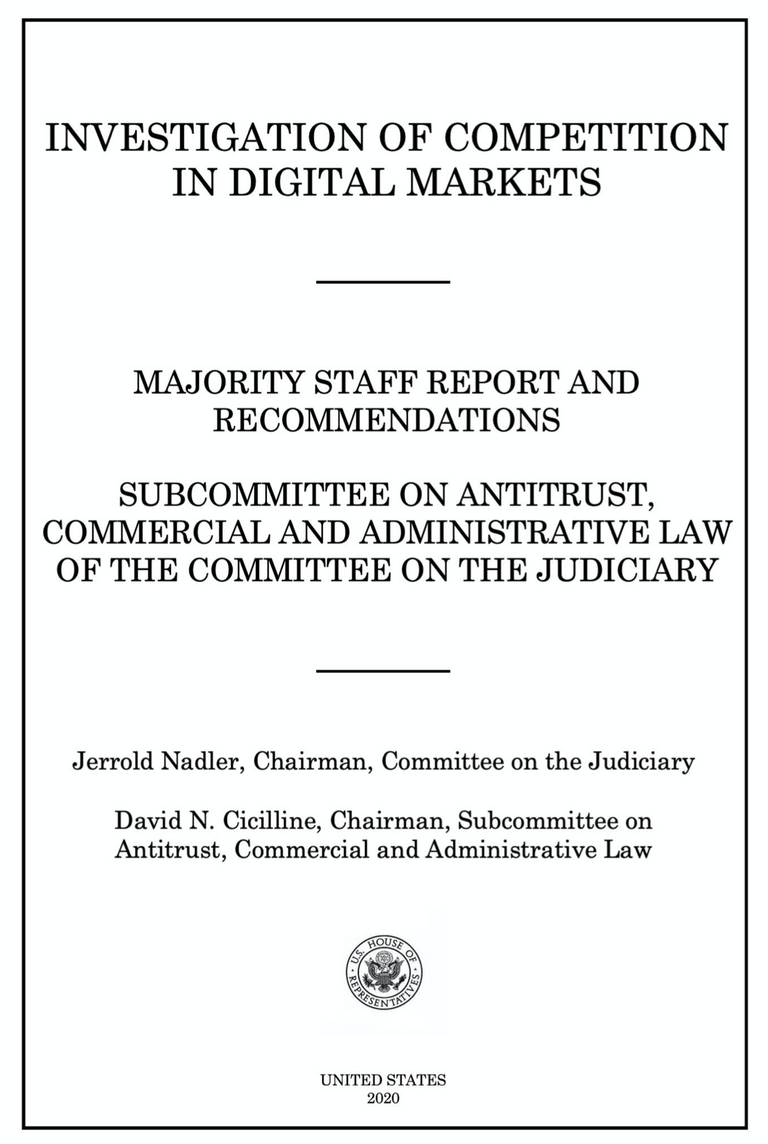
In the last couple of days the Majority Staff of the SUBCOMMITTEE ON ANTITRUST, COMMERCIAL AND ADMINISTRATIVE LAW in the US's House of Congress Judiciary Committee has issued a mamoth 449 page report on competition in Digital Markets.
I'm going through it.... but for now I'm looking first at what it says about Facebook. I thought my notes might be of interest to others. At the end I'll post some links to other places I'm getting useful information on this work.
Of course I'm going through this with an eye on information which might help or bolster our @jpbliberty #CryptoClassAction case aginst big tech for acting together to ban the entire cryptocurrency industry (and most tech based on blockchains) from advertising in early 2018.
Jumping straight in to the Facebook section, which starts at page 133, this caught my eye:
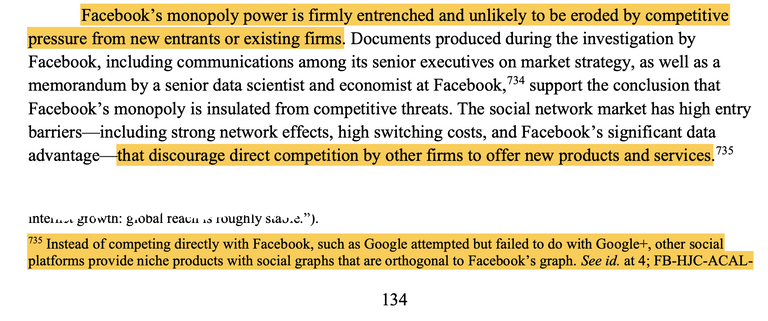
They correctly see that competing head on with Facebook is very difficult.

However, the report then goes on to give extensive reasons why Facebook has a monopoly in terms of share of user's attention. And on this it surely is. But the language in the report seems to miss the fundamental importance of having that monopoly.

They give reasons why YouTube, despite competing for overall attention (which it does) is a "separate market". This relates purely to the existing US statutes and laws on anti-trust behaviour. Facebook claims that all attention based internet business is competitive with all others. This sub-committee is trying to say they are different markets.
That matters for existing US law, but misses the much bigger picture.
They're looking at "users of Facebook" as the general public who are writing about their kids, or posting videos of their pets. These are just the dumb cows being milked, not the product.
The real "users" of Facebook, i.e. the revenue streams are those who buy advertising on the network. It seems that this report is not written from their standpoint and makes the parts I've read so far annoying and irrelevant to reality.
They then launch into a detailed and absolutely fruitless explanation of how hard it is to move - as a simple, dumb, un-paying, user - from one network to another. Of course it is.
Eventually they do note a very important part of the revenue generating loop that Facebook has and how, in the past, Facebook has breifly allowed other businesses to grow on its platform before shutting them down.
They give an example from Spotify's early growth, they could have included early farming games. The committee seems to see this as a benefit, but of course when it comes to the 2016 use of Facebook by Trump's team (and the whole debacle over Cambridge Analytica), suddenly the hyper partisan champions of the common man, didn't like it any more (even as a report today concludes Cambridge Analytica didn't do anything much at all that others weren't doing at the time).
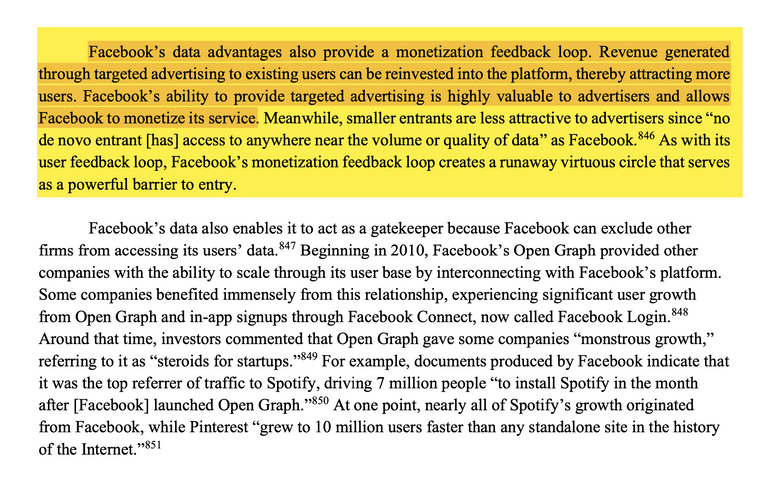
After a lot of discussion about the acquisitions of Instagram, WhatsApp and a few others, the committee does state that Facebook had a deliberate strategy to "acquire, copy or kill competitors".

To me it seems that Zuckerberg decided in 2018 that anything built and or financed by blockchain based, public infrastructure cryptography was going to be a significant future threat to Facebook. And he's right.
As the committee says: "Facebook weaponized access to its platform". They're not talking about access to advertising, but that's because of their blind spot as to the true market dynamics driving Facebook, in my opinion.

The point here is that while other, similar Web 2.0 systems and apps might compete with Facebook for the attention of users, only Web 3.0 systems threaten to fundamentally cut a company like Facebook out of the monetization chain and allow individuals to move up to the point where they can monetize their own data and content instead of leaving all the value with a middle man like Facebook.
Eventually they do get to Digital Advertising.
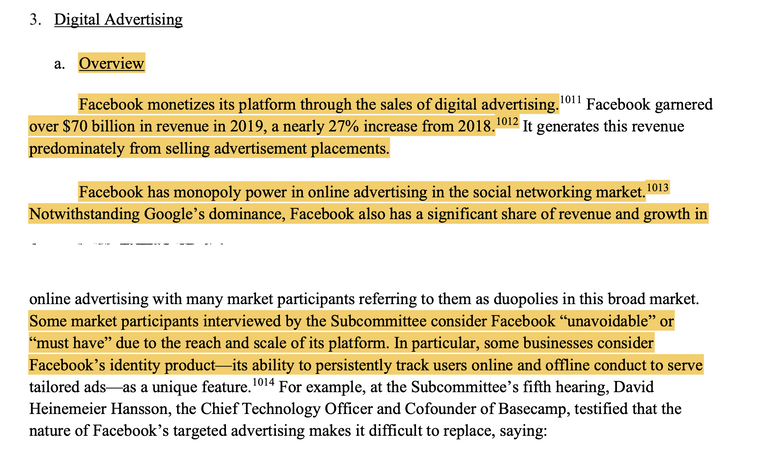
Please note the PDF from the committee is a typical PDF disaster and highlighting specific sections is completely hit and miss.
The report explicitly notes that Australia, British, French and German authorities have recognised that Facebook has a crushing monopoly in online advertising.
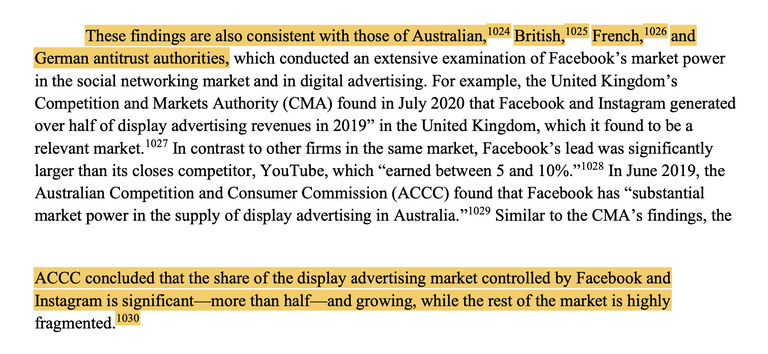
Ultimately I haven't had time to review the entire document. These are just a few notes on the specific section looking at Facebook.
For a good video on the report's look at Apple, I can recommend Hoeg Law's take: he is specifically looking at this through the Frame of the Epic Games vs Apple lawsuit primarily over access to the iOS app store.
Another good summary comes from Casey Newton's new Platformer Substack newsletter.
This report is the start of a legislative process, it could be years before anything substantial happens. I still believe we will score a major blow in our ongoing case in Australia, long before governments around the world figure out what to do about these abusive tech platforms.

Congratulations @brianoflondon! You have completed the following achievement on the Hive blockchain and have been rewarded with new badge(s) :
You can view your badges on your board and compare yourself to others in the Ranking
If you no longer want to receive notifications, reply to this comment with the word
STOPDo not miss the last post from @hivebuzz: